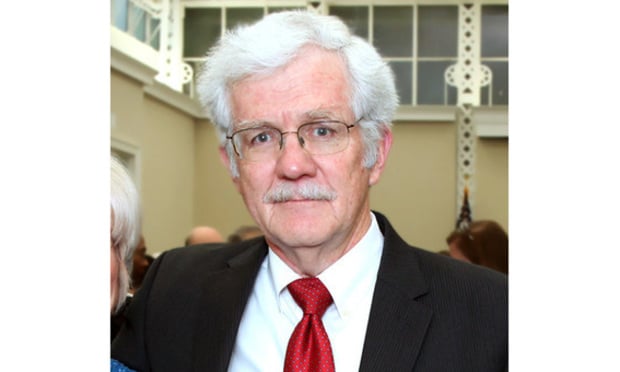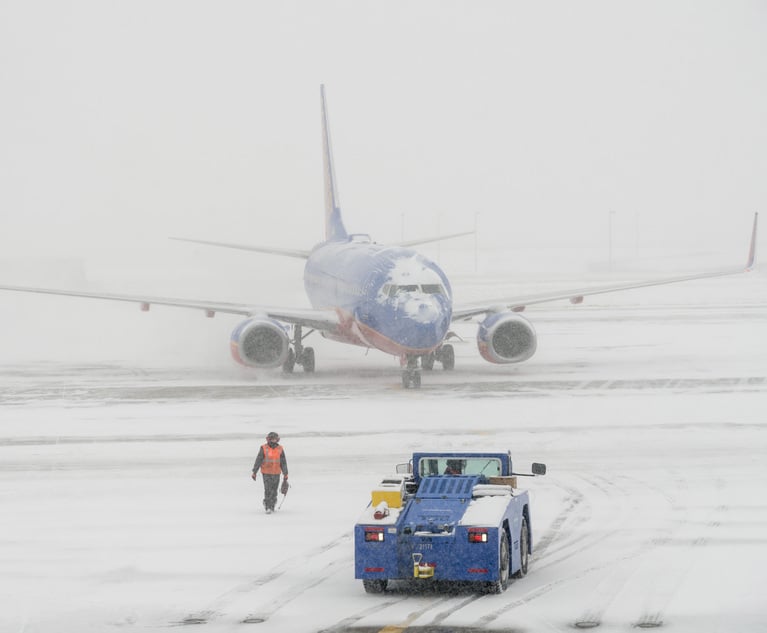11th Circuit Chief Judge Concurs Specially With Himself in Ruling on Royal Caribbean Rape Case
Chief Judge Ed Carnes felt so strongly about a lawsuit alleging Royal Caribbean could have stopped a teenager from being gang raped by passengers that he concurred specially with the opinion he'd authored, citing data.
July 29, 2019 at 01:23 PM
6 minute read
 Chief Judge Edward Carnes of the U.S. Court of Appeals for the Eleventh Circuit. Photo: Guerry Redmond/ALM.
Chief Judge Edward Carnes of the U.S. Court of Appeals for the Eleventh Circuit. Photo: Guerry Redmond/ALM.
Chief Judge Ed Carnes of the U.S. Court of Appeals for the Eleventh Circuit concurred specially with his own opinion for the panel, reinstating a lawsuit against Royal Caribbean Cruises Ltd. that alleged the cruise line was negligent over the gang rape of a young passenger.
“Usually, there is nothing else for the author of a majority opinion to say, but here there is,” Carnes wrote.
The victim, a minor referred to in the complaint as K.T., claimed she was brutally raped by a group of male passengers who led her to a cabin after plying her with alcohol at the ship's public lounge.
U.S. District Judge K. Michael Moore in the Southern District of Florida had dismissed the lawsuit for failure to state a claim, ruling that the allegations did not show that Royal Caribbean breached its duty of care.
But Carnes disagreed, backed by Eleventh Circuit Judges Robin S. Rosenbaum and Frank M. Hull, who found the ship's staff could have stopped the rape.
Miami attorneys Michael A. Winkleman and Carol L. Finklehoffe of maritime firm Lipcon, Margulies, Alsina & Winkleman handled the appeal. They claimed the alleged attackers had given alcohol to K.T. in view of crew members, some of whom were responsible for watching security cameras, but who allegedly did nothing.
Assuming the allegations were true, the Eleventh Circuit found the cruise line breached its ordinary duty of care to the plaintiff. And because she was a minor, the court found that staff were not only responsible for stopping her from buying alcohol, but also for stopping other passengers from buying it for her.
“It is self-evident from the allegations of the complaint that but for Royal Caribbean's breach of its duties of care to K.T. she would not have been brutalized and gang raped,” Carnes wrote. “If the allegations are true, Royal Caribbean proximately caused the alleged injuries.”
Counsel to Royal Caribbean, Darren Wayne Friedman and Karen Foy Grossman of Foreman Friedman in Miami, deferred comment to their client. However, Owen Torres, a spokesman for Royal Caribbean, declined to comment on the case, but said the safety and security of guests is a top priority.
The defendant has denied any wrongdoing and had argued that if the court blamed it for the attack, that would essentially make cruise lines insurers of their passengers, by imposing strict liability for harm suffered. But the Eleventh Circuit pointed out that negligence was the issue, not strict liability.
Concurring specially, Carnes added that publicly available data reinforces the plaintiff's allegations that Royal Caribbean knew or should have known about the dangers of sexual assault on its ships.
Cruise lines have been required to keep records of all complaints of sexual assaults and other serious crimes since 2010, which are given to the FBI and the Department of Transportation, according to the opinion. Carnes noted that the court can take judicial notice of those incident reports.
According to transcripts from oral arguments referenced in the opinion, there were more than 20 sexual assaults on Royal Caribbean's ships between 2010 and 2015, not counting those which were still under investigation. Carnes said those numbers are likely understated, and yet amount to almost one-third of the number reported by all cruise lines.
This information, Carnes wrote, reinforces plaintiff's claims of negligence, particularly since there have been congressional reports on it.
“And it would be absurd to suggest that a multi-billion dollar business like Royal Caribbean was not aware of congressional reports about the problem of sexual assaults aboard its cruise ships,” Carnes wrote.
'A hidden epidemic'
It's a landmark ruling, according to Winkleman, who said it's the first time an appellate court has set out a clear duty to warn of rapes and sexual assaults on cruise ships, something he and his team have long argued for.
 Michael A. Winkleman. Photo: J. Albert Diaz/ALM.
Michael A. Winkleman. Photo: J. Albert Diaz/ALM.“For years, our firm has been handling rape and assault cases on cruise ships, and we've always described it as a hidden epidemic of what was going on at sea,” Winkleman said.
No criminal charges were brought against the perpetrators, according to Winkleman, who said that was partly because the plaintiff didn't report the assault until months later during a therapy session, and because security staff didn't investigate after finding K.T. passed out in a hallway.
Winkleman said the ruling will likely send a strong message to cruise lines that they must do more to protect passengers.
“I would be shocked that, since the opinion has come out, if [cruise lines] are not already having meetings on how to best deal with this opinion and respond to the opinion,” Winkleman said.
The opinion drew from Royal Caribbean's website, which says passenger safety and security is of highest priority for staff, who are committed to preventing illegal activity and will take action to ensure passenger safety.
“Not if the allegations of the complaint are true,” the opinion said, later adding, “If the allegations of the complaint are true, Royal Caribbean's approach to protecting passengers from being sexually assaulted and raped certainly could be improved. One of the purposes of tort law is to spur along such improvements.”
Read the court opinion:
More appeals:
Florida Judge Warns Against Using Case Law, Not Statutes, to Support Hearsay Exceptions
'Dear Florida Supreme Court: We Need Your Help,' 11th Circuit Writes in SOS About
This content has been archived. It is available through our partners, LexisNexis® and Bloomberg Law.
To view this content, please continue to their sites.
Not a Lexis Subscriber?
Subscribe Now
Not a Bloomberg Law Subscriber?
Subscribe Now
NOT FOR REPRINT
© 2025 ALM Global, LLC, All Rights Reserved. Request academic re-use from www.copyright.com. All other uses, submit a request to [email protected]. For more information visit Asset & Logo Licensing.
You Might Like
View All
U.S. Eleventh Circuit Remands Helms-Burton Trafficking Case Involving Confiscated Cuban Port
3 minute read
Miami Lawyer Guilty of Indirect Criminal Contempt But Dodges Paying Legal Fees
4 minute read
Initial Steps to Set Up a Fla. Appeal: Your Future Self (or Appellate Attorney) Will Thank You
6 minute read
Southwest Airlines Faces $100M Class Action Over Pay Periods
Trending Stories
- 15th Circuit Considers Challenge to Louisiana's Ten Commandments Law
- 2Crocs Accused of Padding Revenue With Channel-Stuffing HEYDUDE Shoes
- 3E-discovery Practitioners Are Racing to Adapt to Social Media’s Evolving Landscape
- 4The Law Firm Disrupted: For Office Policies, Big Law Has Its Ear to the Market, Not to Trump
- 5FTC Finalizes Child Online Privacy Rule Updates, But Ferguson Eyes Further Changes
Who Got The Work
J. Brugh Lower of Gibbons has entered an appearance for industrial equipment supplier Devco Corporation in a pending trademark infringement lawsuit. The suit, accusing the defendant of selling knock-off Graco products, was filed Dec. 18 in New Jersey District Court by Rivkin Radler on behalf of Graco Inc. and Graco Minnesota. The case, assigned to U.S. District Judge Zahid N. Quraishi, is 3:24-cv-11294, Graco Inc. et al v. Devco Corporation.
Who Got The Work
Rebecca Maller-Stein and Kent A. Yalowitz of Arnold & Porter Kaye Scholer have entered their appearances for Hanaco Venture Capital and its executives, Lior Prosor and David Frankel, in a pending securities lawsuit. The action, filed on Dec. 24 in New York Southern District Court by Zell, Aron & Co. on behalf of Goldeneye Advisors, accuses the defendants of negligently and fraudulently managing the plaintiff's $1 million investment. The case, assigned to U.S. District Judge Vernon S. Broderick, is 1:24-cv-09918, Goldeneye Advisors, LLC v. Hanaco Venture Capital, Ltd. et al.
Who Got The Work
Attorneys from A&O Shearman has stepped in as defense counsel for Toronto-Dominion Bank and other defendants in a pending securities class action. The suit, filed Dec. 11 in New York Southern District Court by Bleichmar Fonti & Auld, accuses the defendants of concealing the bank's 'pervasive' deficiencies in regards to its compliance with the Bank Secrecy Act and the quality of its anti-money laundering controls. The case, assigned to U.S. District Judge Arun Subramanian, is 1:24-cv-09445, Gonzalez v. The Toronto-Dominion Bank et al.
Who Got The Work
Crown Castle International, a Pennsylvania company providing shared communications infrastructure, has turned to Luke D. Wolf of Gordon Rees Scully Mansukhani to fend off a pending breach-of-contract lawsuit. The court action, filed Nov. 25 in Michigan Eastern District Court by Hooper Hathaway PC on behalf of The Town Residences LLC, accuses Crown Castle of failing to transfer approximately $30,000 in utility payments from T-Mobile in breach of a roof-top lease and assignment agreement. The case, assigned to U.S. District Judge Susan K. Declercq, is 2:24-cv-13131, The Town Residences LLC v. T-Mobile US, Inc. et al.
Who Got The Work
Wilfred P. Coronato and Daniel M. Schwartz of McCarter & English have stepped in as defense counsel to Electrolux Home Products Inc. in a pending product liability lawsuit. The court action, filed Nov. 26 in New York Eastern District Court by Poulos Lopiccolo PC and Nagel Rice LLP on behalf of David Stern, alleges that the defendant's refrigerators’ drawers and shelving repeatedly break and fall apart within months after purchase. The case, assigned to U.S. District Judge Joan M. Azrack, is 2:24-cv-08204, Stern v. Electrolux Home Products, Inc.
Featured Firms
Law Offices of Gary Martin Hays & Associates, P.C.
(470) 294-1674
Law Offices of Mark E. Salomone
(857) 444-6468
Smith & Hassler
(713) 739-1250






